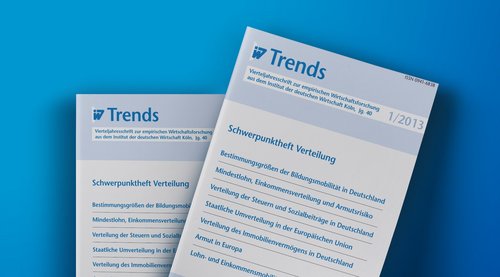An analysis of wage stratification based on the Socio-Economic Panel (SOEP) shows that a minimum wage of 8.5 euros an hour would affect 19 per cent of all dependent employees. Compared with other European countries this is a very high figure. The groups that would be particularly concerned are women, 24 per cent of whom would be affected, the marginally employed (63 per cent) and employees under 25 (50 per cent). The nature of the workplace is also highly relevant. For example, only 7 per cent of those employed by banks and insurance companies earn less than 8.5 euros per hour, whereas the corresponding proportion in the catering industry is 60 per cent. Of the fifth of employees with the lowest gross hourly wage only 27 per cent are in the lowest-earning quintile in terms of equivalised disposable income, which takes the whole household into account. This can be explained by the fact that the net income of employees earning under 8.5 euros per hour constitutes only 38 per cent of net household income and is the highest earned income in only just over half the households involved. Thus, at just under 17 per cent (fulltime employees 12 per cent) the poverty risk for this group is not significantly higher than that for the population at large (13 per cent). A universal minimum wage in Germany would therefore be an inefficient instrument of distribution policy.

Minimum Wage, Income Distribution and Poverty Risk

More on the topic

A Macroeconomic Analysis of Wage-Price Spirals
The subject of this Analysis is the forms that wage-price spirals can take and how they influence macroeconomic stability and inflationary trends in Germany.
IW
IW Distribution Report 2023: Attitudes towards social mobility
Fundamentally linked to the social market economy is the idea that everyone has the opportunity for social advancement, regardless of their social background, and that children should be better off than their parents.
IW